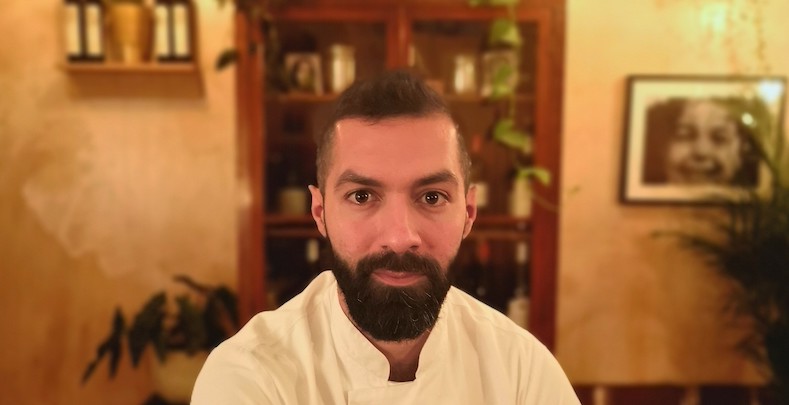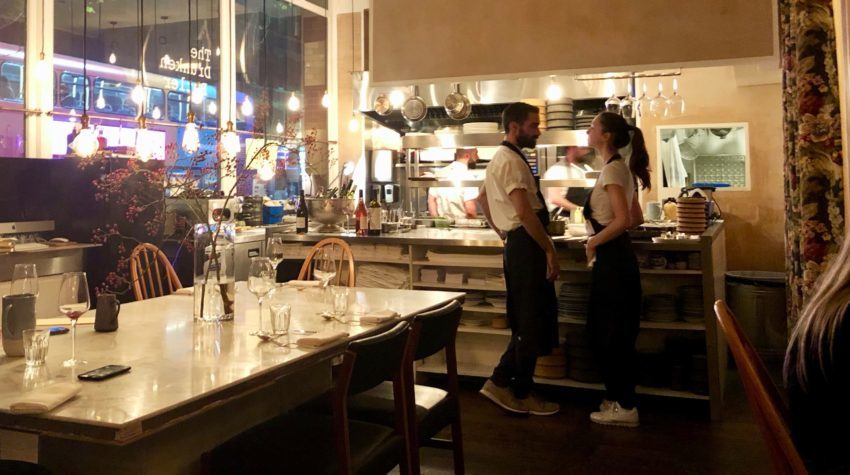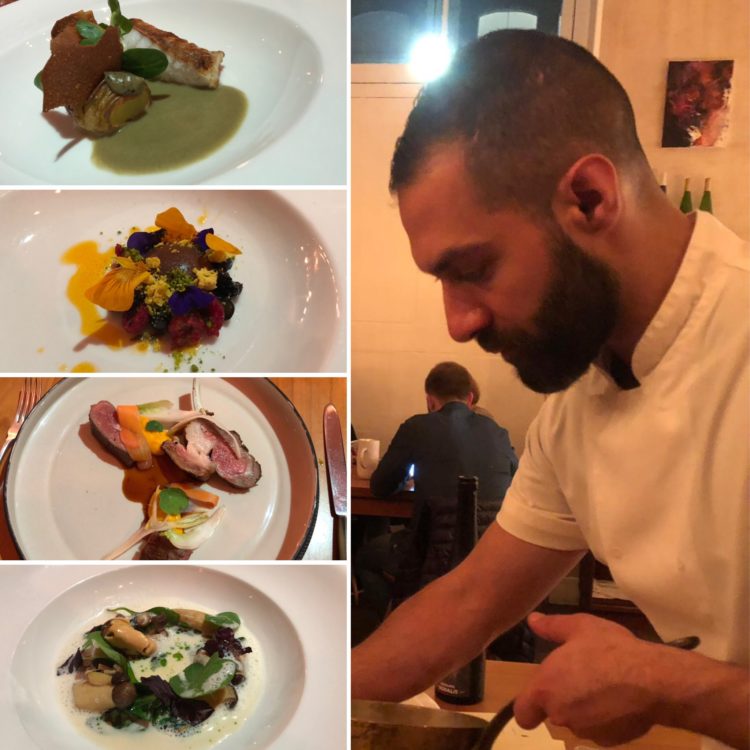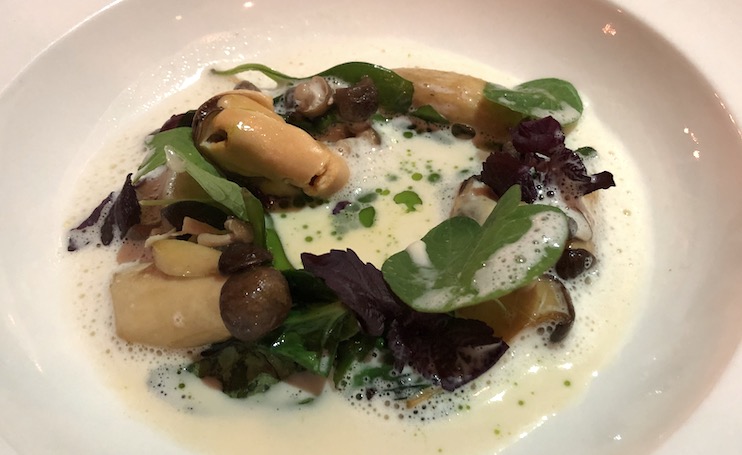
The Drunken Butler is a French led restaurant with Persian influences found near Clerkenwell, London EC1. Yuma Hashemi (above) is a well travelled chef of Persian heritage, whose formative years were spent in his adopted home of Germany. In his late teens, he briefly studied business before a change of direction was accompanied by significant time invested in travelling (and living) through Portugal, Sweden and France. The garnered experience saw Yuma broaden his horizons, develop his passionate ideas for classical technique cooking with Persian influences as well as developing a lasting love affair with wine.
Yuma’s self owned (without the financial masters of backers or banks) restaurant allows a degree of creative freedom and direction, the serious nature of the happenings within is belied by the humble entrance to 20 Rosebery Avenue.
The 36 cover restaurant aims to offer guests an experience which mirrors a Persian home whether it’s the décor, the style of service, or on the restaurant’s ‘Persian Sundays,’ food offering. Yuma has a passion for artisan produce and supports those found locally from the area of East London (as much as possible). The wine list is small producer centric as Yuma sees they deliver unsung gems, mostly biodynamic, natural or organic and predominantly those originating from France, Austria, Italy and Spain.

Simon Carter was delighted that Yuma found time to discuss his personal and culinary journey over food, wine, water and first rate hospitality. The resulting summary of interview conducted at The Drunken Butler in early December 2018 is found below
I never intended to become a chef. In Persian culture there are a couple of traditional family traits that may have conflicting relevance to becoming a chef – the first is that in Persian families it is natural for the parents to see their offspring aspire to becoming a lawyer, a doctor or follow some other similar sort of professional career. At the same time, a central feature of a Persian household is the family meal, where the warmth of family togetherness and the very nature of hospitality come shining through.
In keeping with the family ethos of a Persian household, family photographs form part of the décor at The Drunken Butler, my mother and grandmother smile down on me from the shelves on the wall. The hospitality aspect of being a chef is one I enjoy very much, to the point where I ensure the nature of engagement with the restaurant’s guests is interactive from the moment their incoming call sets the phone ringing.
So I will personally take the booking right through to the level of hands-on hospitality from start to finish of the dining experience. My objective is to be the host for the evening and a host will engage you with conversation as well as cooking something for you to eat and pouring something for you to drink.
Looking back, I would say in my younger days, I had always wanted to travel, learn languages and experience different cultures – part of the latter was experienced through cuisine. While I grew up and worked in Germany (with my family) I later travelled and lived for periods in Portugal, Sweden, and France.
My first trial double shift was 18 hours long and I did not stop working, as I was so excited and passionate to be in the kitchen, I just wanted to impress. Something stuck with me from then to this day and I still use with all my apprentices – at the end of the trial the head chef said to me, “you choose, do you want this job, do you want to become a chef?” I was taken aback, she told me all the bad news that comes with the commitment and dedication required to be a success, including the exhaustion and unsociable hours. I now say the same thing to my new recruits and give them the choice as to whether it is something they want and not something I might want from them or for them…
Having previously studied business, I felt it was natural thing to do to study cooking. I acquired a copy of an encyclopedia of cookery, the great Larousse Gastonomique (first published 1938 and prefaced by Escoffier) and found the recipes and cooking techniques described fascinating. A modern edition sits on the bookshelf in the restaurant.
I see cooking as both an art and a science; your instinct, your feeling and your taste memory come from the experience of learning – part of that is the ‘how to’ science which you can read about, be shown or learn by doing through trial and error but a key part, which separates the enthusiast from the professional, is from ‘within.’ This perhaps defines the art of creating dishes.
When you lead a professional kitchen there is another art, which is the art of managing and motivating people. Even when creating the core product of the restaurant it is imperative to get interactive creative input from the team, to have buy in to what you are wanting to achieve together as a restaurant. This also helps everyone, myself included, to learn and develop in so many ways, as well as developing the team. Just as during my journeys I learned from many head chefs, I also found great gems of knowledge from stagiers who had come from other cultures or had other experiences. One of my chefs once said “we’re not running a 100 metres, we’re in a marathon.” By that he meant evolution not revolution, we do not need nor expect to be the very best we can be overnight, these things take time.
During eight years in France, I found myself accepted into the culture of the Bordeaux region of France, where people were completely welcoming to someone of a different nationality and without any grasp of the local language. I was fortunate to make contacts and friends with many chefs, sommeliers but also with the great wine Chateau such as Chateau d’Yquem in Sauterns and Chateau Petrus in Pomerol. So over time I learned about the culture, the food, the wine, the language and what living and loving really meant in that region of France.

The style of Yuma’s cuisine sampled in the evening tasting menu, included the bold and the elegant. Within each dish there proved a significant demonstration of classically trained technique but with the eagerness to gently explore cultural Persian roots in their composition. As a result, some dishes might be considered robust while demonstrating complexity of character. Indeed a fine Cabernet led wine from the Medoc or a classic Hermitage from the Rhone Valley, may deliver a certain immediacy but thereafter unfold an array of flavour complexity, elegance and indescribable subtlety. Such moments are those few seconds when a thousand angels teardrops fall on your tongue.
As a metaphor for his cooking, this may be going a little overboard on Yuma’s behalf but he does profess to having developed a love of wine during an eight year stay in Bordeaux and the dishes dabble with pairing relatively strongly flavoured elements with a delicate protein, which dictate the walking of a culinary tightrope to a balanced and harmonious conclusion. On each occasion this is achieved successfully.
Consider for instance cooked Oysters, delivered with a required acidic piquancy but balanced with an unusual pistachio paste – Or Scallops, delicate, sweet and seasoned with a little natural salt, paired with sorrel, squid ink crisp, trout roe (the natural salt) and courgette. The squid ink is a natural partner, (as discovered decades ago by Pierre Koffmann at La Tante Claire in Chelsea) however the sorrel combined with the Persian favourite of courgette delivers a greater flavour punch: Yuma clearly posseses a wise and sensitive palate as this, like each and every tasting menu treat, delivers its intended affect. One of the new forays into harmonious flavours on the palate, is based on wild mushrooms, spinach oil and brought together by a luxurious saffron mussel velouté, this leans toward more delicate notes and a greater complexity masked by its apparent simplicity (below), as one might find in a fine white burgundy!

Kaskh-e-bademjoon with smoked eel and roast aubergine and sundried fermented yoghurt invokes true Persian memories to those in the know, whereas a lamb with endive main course treads a more familiar path to fine dining guide.
Overall, since it’s opening in December 2017, The Drunken Butler has significantly evolved and proven itself as one of the more exciting additions to the diverse central London culinary and hospitality scene. The continued success and rise to prominence of the chef patron Yuma Hashemi will be followed with interest.



